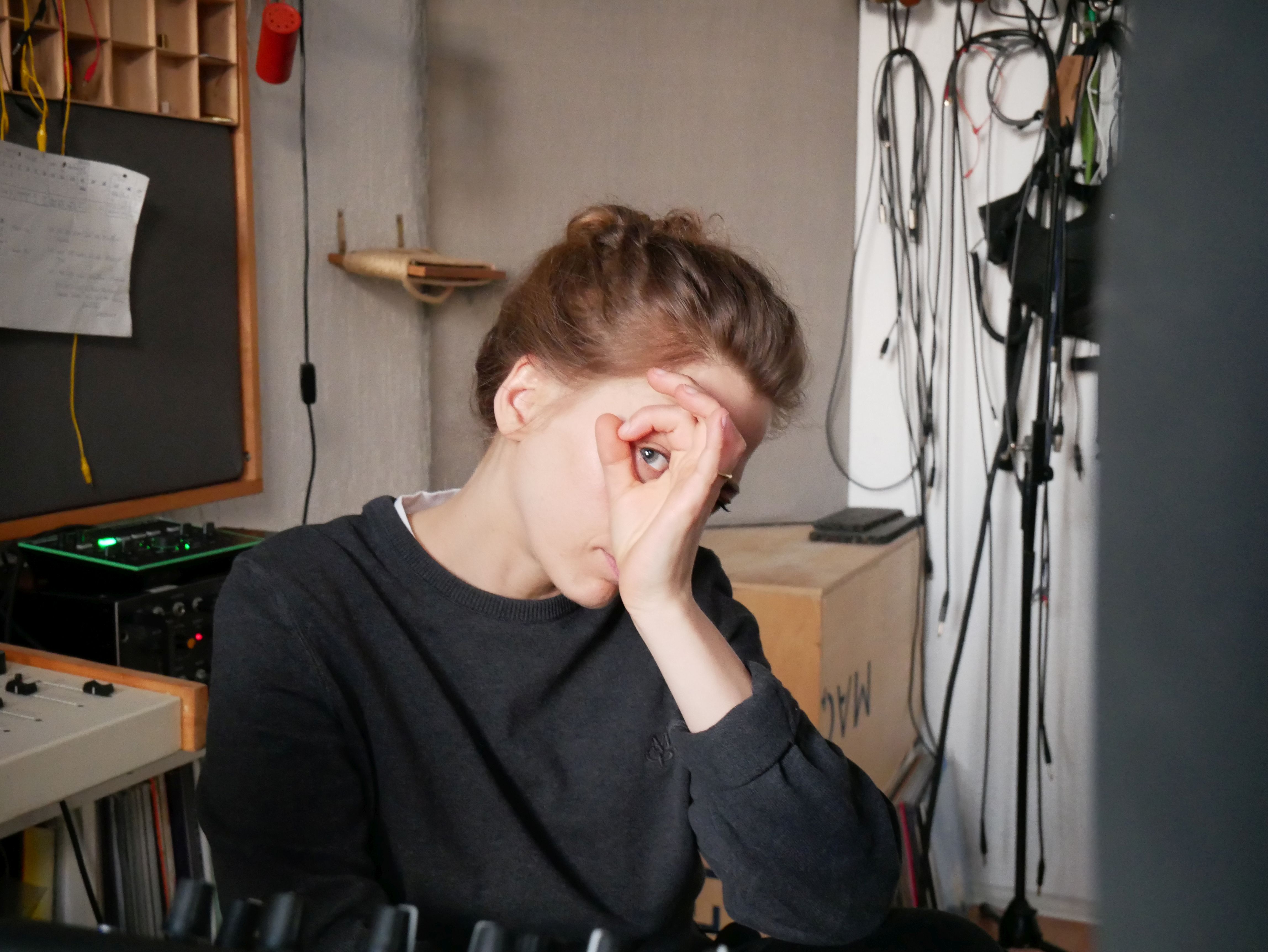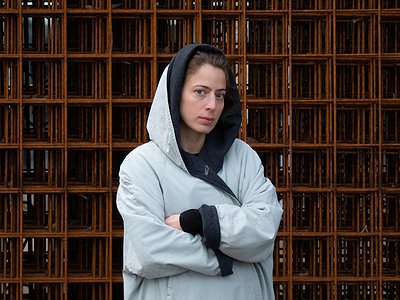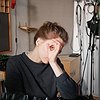Name: Nadia D’Alò aka DALO
Occupation: Producer, vocalist, songwriter, composer, sound artist
Nationality: German
Current release: Nadia D’Alò's new album as DALO, Duster, is out April 26th 2024 via R.i.O.
Recommendations: As for music enthusiasts that also like to read about insights of production, I would recommend the book series 33 1/3 from Bloomsbury. Each book is about an album of music history. It is also quite handy, I really enjoyed reading about Massive Attack's Blue Lines album process and Nick Drake's Pink Moon.
What inspired me in times of stagnation is the work of contemporary dance choreographer Anne Teresa de Keersmaker. Keersmaker's choreography to Steve Reich's Phase pieces for example.
If you enjoyed this Nadia D’Alò interview and would like to keep up to date with her music, visit her on Instagram.
Do you think that some of your earliest musical experiences planted a seed for your interest in production and technology?
The first scene of the movie Hunger in which Bauhaus played "Bela Lugosi's Dead" in a club behind bars had quite an impact on me.
Another movie that comes to mind is Ghost Dog and the soundtrack by RZA. I named a track on the upcoming album after it because the aesthetic and the mood reminded me of it.
Singing in the choir as a kid definitely influenced me in lots of ways, being one voice in a polyphonic group of voices but staying in my tone, rhythm changes, and primarily using my voice as an instrument.
What were your very first active steps with music technology and how would you rate the gains made through experience?
My first steps with music technology were kinda late. When I was around 19 or 20, I started working with adobe audition after my attempt with fruity loops earlier didn't really work for me.
I recorded acoustic instruments like a guitar and my fathers accordion. A DAW was a recording tool for me and I appreciated recording every little tone from my guitar and overlaying it. I had this idea of creating everything myself, so I played a bass through the entire track and restarted it when I made a mistake.
In the beginning, when I wanted a certain synth or drum sound I thought the only way was to own the instrument to do so. Sampling is a method I allow myself to use now but I needed these years of collecting field recordings or trying to record a drum set with 7 microphones to figure it out. To learn to focus and concentrate on things I am good at and use sample kits for the rest.
What I gained with plugins and sample kits is to be able to make a wider range of music that is based on my taste in a certain moment, a more intuitive way of working. What I gained is a good feeling about what I can and can't do and I trust my creative process without getting lost in it.
Were/are you interested in the history of production and recording? If so, which events, albums, artists, or insights stand out for you?
Two of the first songs that made me curious about the production behind it were The Beatles' “A day in the Life” and “Tomorrow never knows,” with the reversed tape effects, the arrangement and repetition that really stood out for and inspired me in my teens.
And I remember being a big fan of the Theremin. I did a paper about the sound and function of the Theremin for school and was eager to play one myself. The melancholy of Clara Rockmore's interpretation of Peter Tschaikovsky's “Valse Sentimentale” moved me very much and is still one of my favourites.
Later on I was really into Steve Reich's tape loops for “It's gonna Rain” and “Violin Phase.” The art of editing tape was a method that fascinated me. It was one of the reasons to study and learn more about audio production.
But “Bella Lugosi's Dead” by Bauhaus is one of these songs where I thought “damn I want to do this too.”
The aesthetic of the delay and a bossa nova rhythm in a completely different context definitely influenced me. I guess that made it's way on my first EP on ESP Institute: I recorded basically everything through my Dynacord.
For your own creativity, what is the balance and relative importance between what you learned from teachers, tutorials and other producers on the one hand – and what you discovered, understood, and achieved yourself? What are examples for both of these?
From my teacher at university I learned how important recording techniques are. But after my degree I only wanted to free myself from them, unlearn them and fool around with the creative process.
This was good to create ghostly crazy sounds, experiment and primarily jam with friends. Passing around the mic, without stopping the music and having a vivid session with ideas buzzing around. A lot of ideas wouldn't be there if I would have set up a condenser mic, putting on my headphones,cut of from the others. But it's better to use it as a demo to catch an idea to later properly record it.
I know it's fun to record through effects and jam. But the more time spent in the recording set up, the less post production time it needs.
How and for what reasons has your music set-up evolved over the years and what are currently some of the most important pieces of gear and software for you?
My music set up evolved slightly as I started playing live. The effect pedals by Strymon are my favourites as they are easy to use, stable and come in handy when it comes to traveling light.
Also for live use I bought an Octatrack to go DAW-less, played two shows as INIT with it and didn't like the handling of it. So now I use it for studio production only and work with ableton which is more reliable. Still my main Effect is the Dynacord SRS 56 analogue stereo delay from the late 70s and early 80s.
Also my 303 clone from xoxbox is in most of my productions. It is perfect for live use, as you can modify, change tune, chain endless patterns and play it half time on the run. I would recommend it for every one that wants to buy gear that is cheap, easy to handle and variable in use.
As for drums, the miami by acidlab is my go to live drum machine. But for studio production I use the Roland TR-808. The way the instruments sound together the perfect circuit is the most fun and powerful instrument.
DALO Interview Image (c) the artist
Late producer SOPHIE said: “You have the possibility with electronic music to generate any texture, and any sound. So why would any musician want to limit themselves?” What's your take on that and the relevance of limitations in your set-up and process?
I have the feeling that I need limitations to a certain degree. I like to understand the instruments I am using. And I have to get creative to modify my old gear, by using certain effect pedals or even chains, by playing around with the EQ of a mixer. To have endless possibilities is too much - but I understand that it can be more efficient.
When I think of limitations, the works of Oskar Schlemmer comes to mind. He created abstract costumes for dancers in his triadic ballet. The costumes restricted the movement of the dancer in a way that it created a totally new way of movement.
I clearly would like to have more possibilities during my live set. But I'd rather be limited than have a problem I can't fix myself because of the lack of understanding of a complex machine that offers me endless possibilities.
From the earliest sketches to the finished piece, what does your current production workflow/process look like?
Since I started playing a solo live set, I mostly arranged and mixed the live material that already worked well which was a nice new development.
But on a blank canvas, so to speak, I mostly start with drums or a certain percussion loop and then I am in kind of trial and error phase, playing with the 303, searching through my archive of field recordings for something or go to my husband's room and record one of his synths. It is our shared studio that also has acoustic instruments and a better recording surrounding.
[Read our feature on the Roland 303]
As for the 303 I like to have a main acid line that I modify whilst recording and then add other 303 notes for some accents and highlights. As the arrangement of the song slowly develops, I re-record instruments when I know more and more where it's going and what the track needs.
Then I mostly would do a session with the microphone. At first, I'll experiment and, depending on the track, I'll record longer vocals for a choir and layer them to have a nice pad. Or I'll be in the mood to write lyrics and do spoken word.
Often I pitch down my voice either through a vocal harmonizer or in ableton to distance myself from the music. For audio editing and arrangement I use fabfilters for EQ, the Valhalla reverb plugin, at times ableton's filter delay (kinda spices things up quickly), ableton compressor and sidechain are in daily usage. A nice tool from time to time is the gate in ableton and it's worth playing around with rhythms that trigger it.
In the post production process, I mostly send my tracks out and through a reverb or delay to add a smoothness. Or to make it just sound of one piece and not different instruments in different rooms.
What, to you, are the respective benefits of solo work and collaborations and do you often feel lonely in the studio? Can machines act as collaborators to you?
I am a big fan of working with another person, as I feel I can go further.
If it is a good match, the other person can inspire and motivate me, the process can be more vivid and full of surprises that function as fuel to keep going. Especially when I am experimenting it is nice to have someone to say: This is it! Do more with this idea! I really need to feel comfortable with a person though.
But working alone has a special aspect to it, too. My work can become very personal as I have no immediate feedback and get into a flow more deeply.





